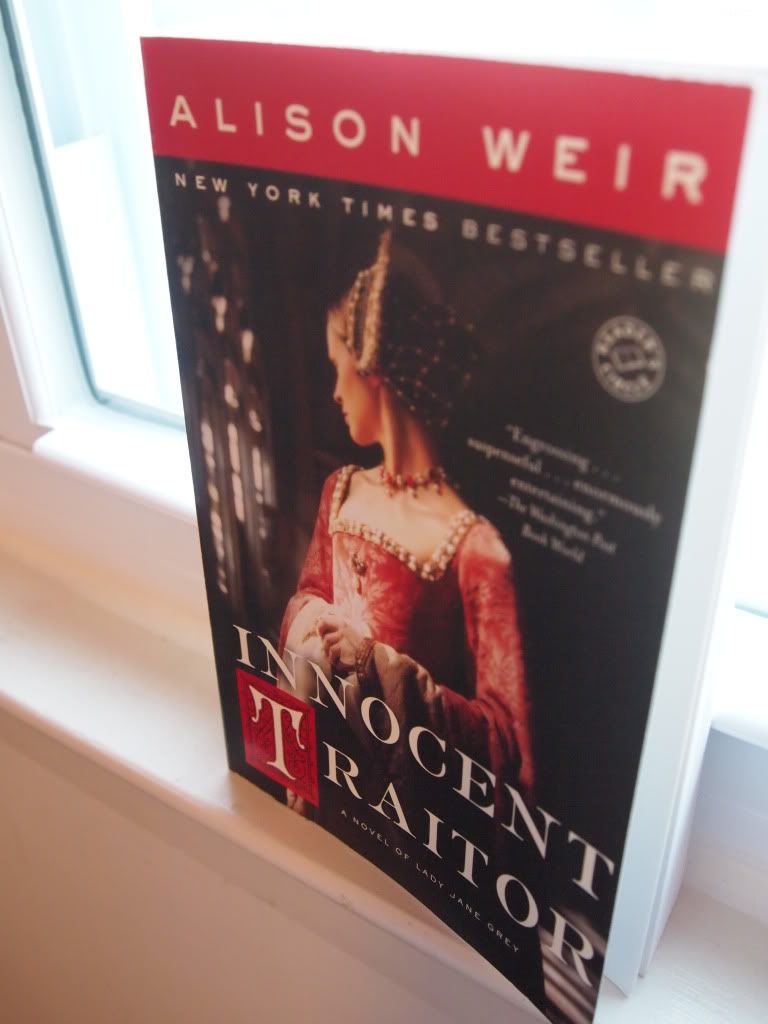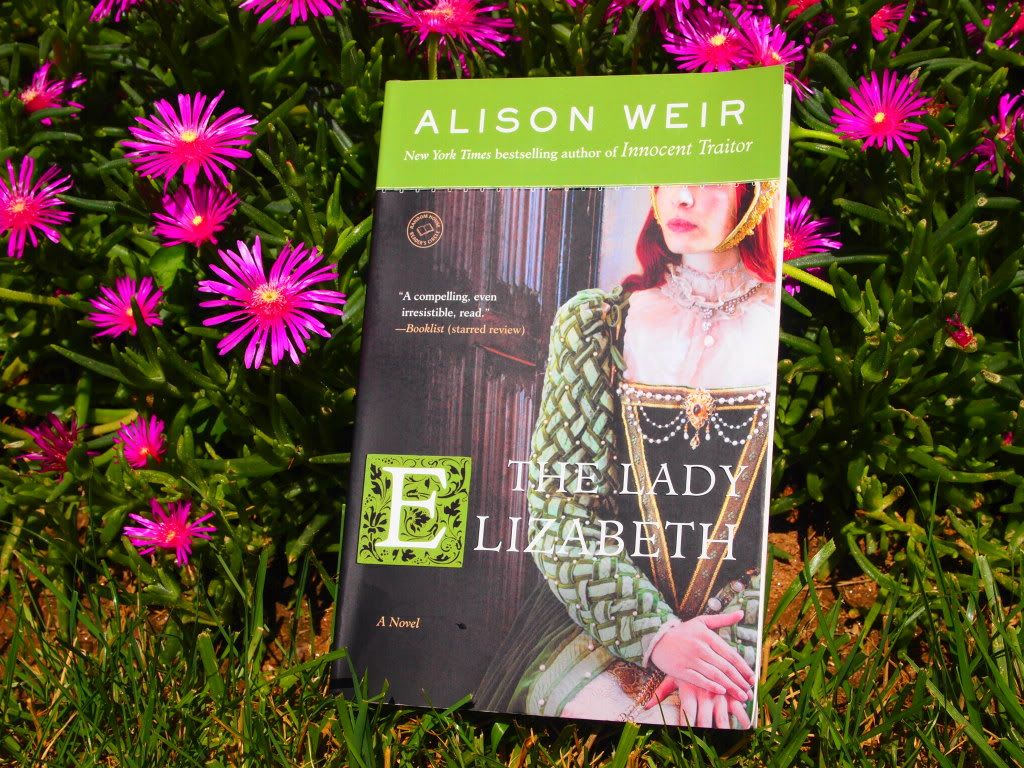
Genre: Historical Fiction
Pages/Format: 407/Soft Cover
Rating: 5/5
Summary: The child of a scheming father and ruthless mother, Lady Jane Grey is born during the harrowingly turbulent period that will see the demise of her famous great-uncle, King Henry VIII. Vexed by not having a male heir, Jane’s abusive parents connive to use their intelligent, dutiful young daughter as a pawn in a dangerous dynastic game. But when the premature death of Jane’s adolescent cousin--and Henry’s successor--King Edward VI thwarts their original ploy, Jane unwittingly finds herself as the center of the struggle for supremacy. And though she has no ambitions to rule, preferring to immerse herself in books and religion, she is forced to accept the crown, and by so doing sets off a firestorm of intrigue, betrayal and tragedy. (from the back of the book)
Short Summary: Various first person accounts of the short life and ten day rule of Jane Gray/Dudley.
Review: I followed up Weir’s My Lady Elizabeth with Innocent Traitor, still in the mood for Historical Fiction. Jane Grey’s story is a new one to me. I’d vaguely known about what happened to her through accounts of other people such as her cousins Elizabeth and Mary, but I never read about Jane exclusively. Needless to say, I was hooked.
Jane’s tale is a very sad one and too often I found myself wanting to throw the book down at the injustice of her life. As too often happened in Tudor England, parents were not always given male heirs as they hoped, and the daughters suffered uncalled for hate and abuse. Jane is often a victim of her mother’s anger, never able to satisfy her mother’s impossible standards. Weir creates this situation with such agonizing detail and emotion that it was so incredibly easy to fall into Jane and understand exactly how she felt. I could feel the exhale of relief when she was able to leave home, or the cold hand that gripped my heart when she was living with her parents.
It’s really amazing watching/reading Jane grow from a meek, mousy girl into a very outspoken girl who isn’t afraid to stand up for herself. Closer towards the end when Jane is forced to be Queen, I can’t believe the bold, brazen things she says! I can’t believe it was the same girl who started the novel. Weir writes Jane as a very believable young lady, and her coming of age is spectacular that I couldn’t help but cheer for Jane when she, a woman, stood up to men who sought to control her.
Jane is an intelligent girl, much like her cousin Elizabeth I, as they both never wanted to marry and much prefer spending time with their books and studies as opposed to what was considered ’womanly.’ (sew, dance, get married, have babies, take care of the house, etc) As a woman, it is so difficult to grasp and understand the thinking of that time and I can feel Jane’s pain as she seeks to control her own life but cannot because she is a woman. I very much enjoy reading about women such as Jane and Elizabeth, who are both very much ahead of their time.
A favorite scene of mine that is likely fictitious but nonetheless a brilliant move on Weir’s part is when Jane receives a gift from Mary, her cousin, a necklace that drips with rubies. When Jane tries it on in the mirror, she is horrified to notice how similar the rubies look like blood on her neck.
As opposed to My Lady Elizabeth, which was told in third person, Innocent Traitor, is told in various first person accounts. There is Jane, Jane’s nurse, both Jane’s parents, Katherine Parr/Seymour, Mary Tudor, and even at the end, the last account is told from the executioner’s POV. I really loved how Weir decided to tell Jane’s story. There really isn’t anything like being able to be in each character’s head and have each puzzle piece to put together to make the bigger picture. I am able to read about Jane from her home, while the next account may be from her mother who is away at court. I think it was a very masterful way to tell Jane’s story.
This book comes highly recommended, about a Tudor girl who may often be overlooked and overshadowed by her cousins, Elizabeth and Mary.
Further Recommendations: My Lady Elizabeth by Alison Weir, The Other Boleyn Girl and The Constant Princess by Phillipa Gregory, I, Elizabeth by Rosalind MilesLabels: Alison Weir, Beth, book review, Historical Fiction, Innocent Traitor

Genre: Historical Fiction
Pages/Format: 492/soft cover
Rating: 4/5
Summary: Even as a very young child, Elizabeth Tudor is keenly aware that people in the court of her father, King Henry VIII, have stopped referring to her as “Lady Princess” and now call her “Lady Elizabeth.” She soon learns why, as her sister, Mary, tells her of the tragic fate that has befallen Elizabeth’s mother, the enigmatic and seductive Ann Boleyn, and that both girls have been declared illegitimate. The death of their father ten years later puts orphaned Elizabeth in even greater peril: Like her mother two decades earlier, she is imprisoned in the Tower of London--and she fears she will meet her mother’s grisly end. Power-driven politics, private scandal, and public gossip, a disputed succession, and the grievous example of her sister, “Bloody” Queen Mary, cement Elizabeth’s resolve in matters of statecraft and love, and set the stage for her transformation into the iconic Virgin Queen--a woman far ahead of her time, an independent spirit who must use cunning and wits for her very survival. (from back of book)
Short Summary: Third person telling of Elizabeth I’s life from birth to her succession as queen.
Review: Historical Fiction is one of my favorite genres, especially concerning royalty. The Tudor time period has been a big focus in my reading and I’ve read several books about Elizabeth already, so I was excited to pick this one up. (I also picked up Weir’s other book, Innocent Traitor, but that will be another review.)
The book is written in third person, something I don’t find often in this genre of book. Most often it’s in first person. (Weir’s Innocent Traitor was in first person, but in My Lady Elizabeth she claims her publisher’s wanted her to write in third person.) While it was difficult adjusting to at first, I found it fascinating being able to see into the heads of secondary characters. For example, Elizabeth’s governess, Kat. Kat is jealous of Katherine Parr, Henry VIII’s fifth wife, because Elizabeth views Katherine as a mother, while Kat feels Elizabeth should be viewing herself as a mother. I’ve never been able to read such feelings from a character other than Elizabeth, having always been limited to first person.
Another upside to this book was the spice Weir added to Elizabeth’s scandal with Thomas Seymour. Elizabeth has always been viewed as a virgin, having never married. BUT, just because she never married, doesn’t mean she didn’t engage in some inappropriate activities… This is another interesting twist Weir added to young Elizabeth’s story, as I’ve never read it in any other Historical Fiction work.
This twist also serves another purpose, that even despite Elizabeth’s inhuman intelligence we’re also reminded of how imperfect and human she is, despite the front she is forced to put up as a princess of England. Weir does a good job through Elizabeth’s youthful indiscretion and infatuation with Thomas Seymour. Even Elizabeth, a girl who claims she will never married and be ruled by a man, is susceptible to lust and sexual desire the same as any other person.
Elizabeth’s relationship with her sister is also a very amicable, healthy one. Mary was not made out to be a bad guy, even in the infamous episode of Elizabeth’s imprisonment in the Tower of London. They were too sisters who loved each other, but circumstances made life and their relationship rocky. Mary was an aging woman, dreaming for a child, devout in her religious beliefs and her only fault was that she was influenced by those who hoped to do evil to her country.
However, I did have one downside to this book. At times throughout reading, I almost felt bored. Maybe this is because I know the ‘story’ already, but it just was as gripping at points. It was not bad enough that I couldn’t finish it, but I do recall times when I sat the book down because I wasn’t into it.
In the back of My Lady Elizabeth, Weir shares that she will be making a sequel called, The Phoenix and the Bear and it will chronicle Elizabeth and Robert Dudley’s relationship. I am definitely excited for when that day comes and will totally pick up the book. I enjoy reading about Elizabeth and Robert’s love affair.
Overall, if you enjoy Historical Fiction or Tudor England I highly recommend reading this book.
Further Recommendations: Innocent Traitor by Alison Weir, The Other Boleyn Girl and The Constant Princess by Phillipa Gregory, I, Elizabeth by Rosalind MilesLabels: Alison Weir, Beth, book review, Historical Fiction, Lady Elizabeth

